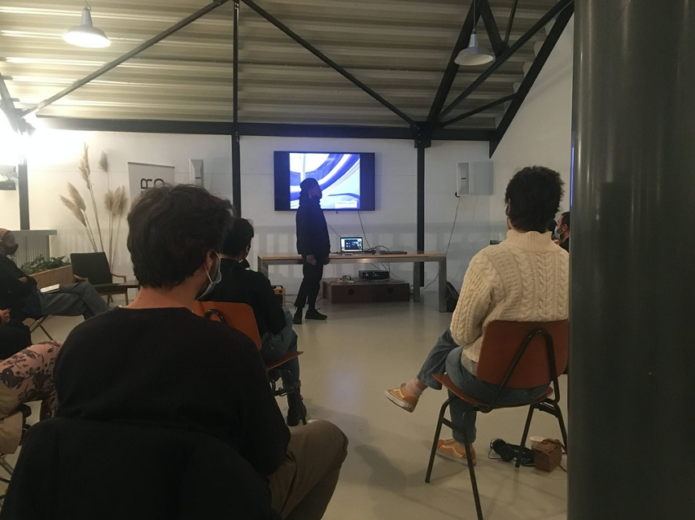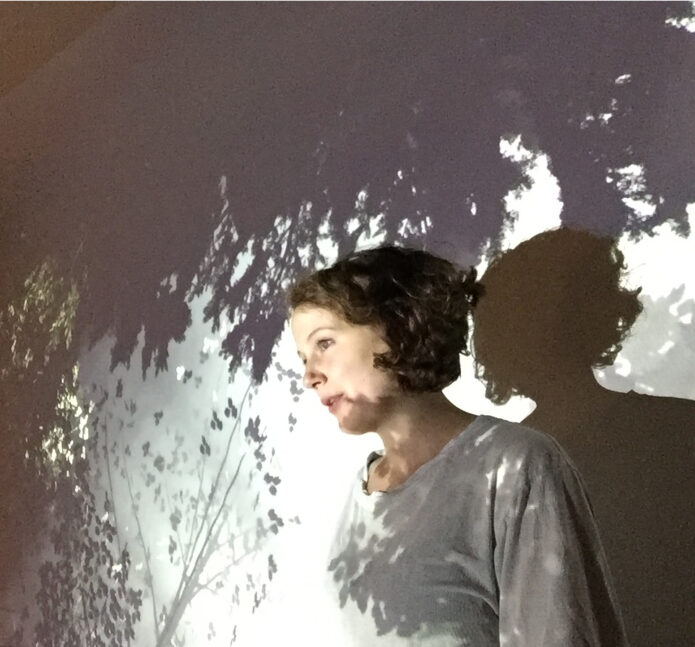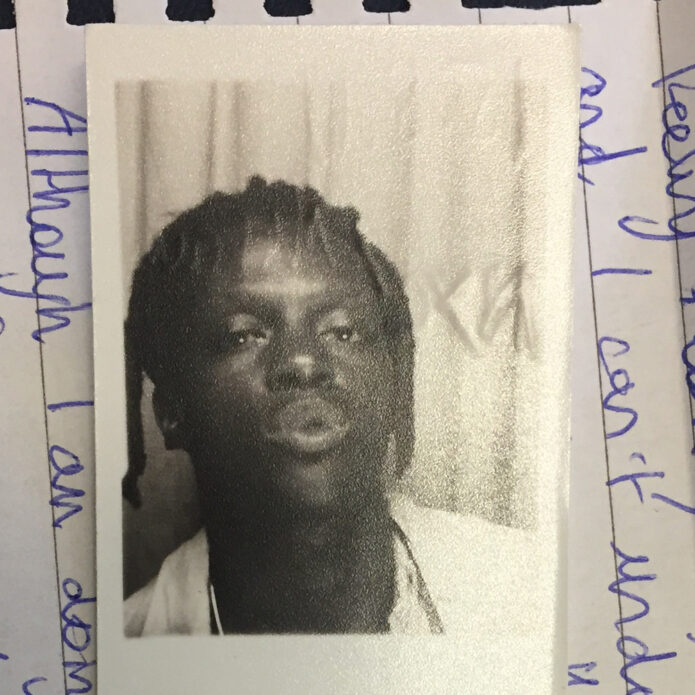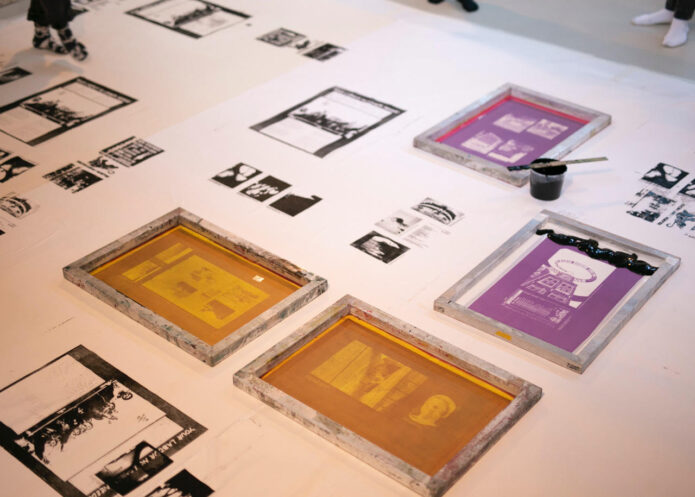 Participants from Decolonial Futures in Soweto, South Africa
Participants from Decolonial Futures in Soweto, South Africa Decolonial Futures: First Term
Introducing a new series of Decolonial Futures! Each week Framer Framed will host a sessions of the Decolonial Futures cultural exchange programme.
Decolonial Futures is an exchange programme organised between Framer Framed, the Sandberg Instituut, the Rietveld Academie, and FUNDA Community College in South Africa. The programme was inspired by the desire to work collectively towards a decolonial future in which an equal exchange of knowledges and perspectives from students working across the disciplines of art and design could be established.
As a type of archive to connect the parallel course in Amsterdam and South Africa, highlights of the discussion and a reading list will be posted here each week to make decolonial knowledge and practices more accessible to everyone.
The organisational team consist of Dorine van Meel and Ibrahim Cissé (Sandberg Instituut / Gerrit Rietveld Academie, Amsterdam), Simangaliso Sibiya and Phumzile Nombuso Twala (Funda Community College, Soweto) and Evie Evans (Framer Framed).
Kick-off
20th October 2020
Last week marked the first session of the Decolonial Futures Cultural Exchange Programme! Led by educator and poet Ibrahim Cissé, our first socially distanced class in Framer Framed brought together eager students from a wide-range of disciplines from the Sandberg Instituut, the Rietveld Academie and Amsterdam University College with members of Funda Community College in Soweto, South Africa.
Ibrahim began the session by reading his own poetry, declaring: “I’m not here to teach you about the decolonial… Just as you do not learn about life, but learn while living.” The aim of the first term is not on the transfer of knowledge to recite in essays, but the breaking of traditional frames of thought and art education. By focusing on specific projects informed by counter-hegemonic movements and initiatives around the world, Decolonial Futures departs from the lived experience and activism from participants in the Netherlands and South Africa.

Therefore, this first session was reserved for introductions; for the students and the collaborators from FUNDA. Simangaliso Sibiya, an artist and one of the organisers of Decolonial Futures, as well as artist Njabulo Malata were able to join online from Soweto, introducing themselves and their connection to FUNDA to the students here in Amsterdam. The students were given a brief history of Funda in the context of South African racial politics. Established in 1984 – ten years before the end of apartheid – FUNDA began as a radical interdisciplinary and multidimensional black-run arts centre in Soweto at a time when non-white citizens were legally banned from forms of tertiary art education. In 1994, It became Funda Community College, dedicated to offer creative and artistic trainings, such as photography as a tool for social documentation.
A great draw for the first term of Decolonial Futures is that students will be able to actively shape and reflect on FUNDA’s photographic archive, also known as Amaciko Imaginerium. For this project participants in Amsterdam will familiarise themselves with FUNDA’s unique socio-cultural context which is inseparable from the rich history of Soweto and South Africa at large. Both groups of participants in South Africa and the Netherlands will be invited to think critically and to reflect on their position and the tensions between local and global narratives. During the session, participants called attention to how the pandemic has already changed the way we interact and think of digital spaces as ways to disseminate information that challenges historical and hegemonic systems.
Another stirring question asked by Ibrahim to the participants was: “What are you willing to give and what are you willing to lose?” Many students gladly suggested giving their time, energy, sincerity and respectfulness towards each other as the foundation of this project is working collectively. But what other processes are involved in methods of artistic activism? Simunga Sibiya and Njabulo Malata questioned: are the participants willing to give up positions of power or relationships with people in pursuit of genuine decolonisation? They emphasised that decolonization is a way of being, and assessing the world, the archive a mean to share this with the world. Students from all backgrounds are welcome, their heterogeneity will give shape to the potential creative outlets. Simanga summarised the long term goal for the cultural exchange programme and that “It’s more about how do we build a platform for the next generation to take into the future” as part of many potential decolonial futures.
‘How did we end up here?’
27th October
The second session of Decolonial Futures was a historically dense class under the theme of ‘How did we end up here?’ with a brief look at (de)colonial formations in South African throughout time. In order to understand Funda Community College and its history, students were given a run through of South Africa’s complicated history from the Bantu Expansion in 1000BCE to the late 1990s post-apartheid South Africa.
In the beginning of the session, students were joined, through Zoom, by Lauren Alexander, a South African artist now based in the Netherlands. As part of her work with Foundland Collective, Lauren collaborated with Funda Community College for The Cardboard Monument Project (2011), a public intervention on Walter Sisulu Freedom Square, in Kliptown, Johannesburg. This square was the site of the 1955 unveiling of the Freedom Charter, a series of freedom demands set out by people in towns across South Africa. Initiated by the African National Congress (ANC), the document – now enshrined in a monument in Kliptown – symbolises the recognition for a complete re-structuring of the nation, and how these demands have still not been met today. Through the readings of Akala and Tshepo Madlingozi, the participants are able to think more critically about discourses of colonial history, democracy and justice.
Simanga Sibiya phoned in this week, joined by Bongani Nkosi, to expand more on Funda’s history of social documentation through photography. The driving force behind the Amaciko Imagineriumarchive is the importance of self-representation. The people of Soweto were able to use photography as a way to construct their own narratives and perception, opposing the poverty porn which is often associated with representations of Africa. “What does it mean to be a youth during certain periods in Soweto?” and how can this be communicated to a global world? During the pandemic especially, photography has been a vital means of documentation for the artists at Funda for what Simanaga called “future histories”. As decolonial scholar, Madlingozi argued in the interview: There is neither truth nor reconciliation in so-called South “Africa”, “the past is in the present ”. Decolonial Futures moves away from a teleological and colonial understanding of time; there is not necessarily an A to B route in understanding histories of settler colonialism, as Madlingozi emphasises. The decolonial is a work in progress, asking “How do we do things? And how do we document them?”
What are photographers’ contribution to the decolonial? What can we learn from them?
3rd November
At the halfway point of the Decolonial Futures sessions, students continued the discussion around the restitution of African material culture. Inspired by the work of Open Restitution Project, Ibrahim initiated a group “simulation” in which students – divided into groups- represented various parties involved in restitution debates. Team represented the governments of South Africa and Netherlands, museums in both countries, and the students from FUNDA in Soweto and the Decolonial Futures Programme in Amsterdam in order to highlight the importance of transnational conversation that needs to happen. Participants reckoned with the questions: “Can repatriation of art and artefacts truly happen? And what would need to happen if the conversation occurred across nations and with multilateral policies?” Of course there was no unanimous conclusion and the class turned towards forms of contemporary art as practices of repatriation and decolonisation.
Through the resources of a conversation with Berlin-based Nigerian photographer Akinbode Akinbiyi on the NKATA: Art and Processes Podcast, students delved more into a discussion of the history of photography, and in relation to colonialism. A key point that stuck with one student was Akinbiyi’s preference in English for “making a photo” rather than taking one. The phrase suggests more of an awareness of your surroundings, and removes the false objectivity often associated with photographs and photographers. In anticipation of working with FUNDA Community College’s photographic archive, Amaciko Imaginerium, the significance of photography as a tool of colonisation and historical marginalisation was acknowledged.
This week, conceptual artist and photographer Zana ‘Ndebele Superhero’ Masombuka joined the session online to share more about her own contemporary practice. Raised in KwaNdebele, Zana uses her cultural heritage to represent and centre African stories. Hesitant to identify her work with the term “afro-futurism”, her work uses a completely different language informer by her Ndebele culture rather than any Western discourses. For Zana, art is both a sacred ritual but something that belongs in the everyday, too. Museums often remove art and history from their communities in an attempt to contain art. Zana emphasised her perspective of art, an idea passed down in her family and community, as an “act of stillness”. Art is simply part of her existence, it is a practice to understand herself in a historical context and is created without knowing what the final product will be. Zana’s inspiring energy and practice offered a new understanding of the participants role in the cultural exchange of the Decolonial Futures programme; their interactions are brought together to create a new space where art and culture can manifest and evolve.

Ibrahim Cissé leading a Decolonial Futures session at Framer Framed. Photo: B. Ellialtioglu, November 2020
Can Images Speak?
17th November
Due to Framer Framed’s brief closure in response to the governments strengthening of the partial lockdown, this week’s session was on Zoom and students were able to directly meet and communicate with participants from FUNDA in Soweto.
The fourth session of Decolonial Futures took a musical turn, beginning with a moment to listen to award-winning jazz musician Thandi Ntuli’s Setting the tone for exile. Ntuli’s experimental style and collaborative culture if jazz takes inspiration from her own experiences and heritage, growing up as a young woman in Pretoria in South Africa. Whilst her music is interpreted as political and decolonial she argues in the panel discussion from The Showroomthat she is merely using art and music as a form of personal story-telling which prompted the students to think more deeply about their own motivations are, or what the purpose of art is for them. Listen to the same song as the students of Decolonial Futures here.
Also originating from the area of Pretoria in the 1960s is the genre of Malombo music, for which students delved into both the theory and practice of Malombo. As a fusion of South African folk styles and modern music, Malombo was popularised by Phillip Tabane and represented the sound of change and political power for many South Africans, explained musician Mthokozise Mazibuko. Mtho, Bongani Mtsweni, and Inkhomo as the band The Ritual Trio gave an uplifting live performance of their music through Zoom for everyone in Soweto and Amsterdam.
Afterwards, artist Njabulo Malata gave a presentation to tour Soweto through images which include his everyday sights such as public spaces and local monuments. Maguete, a photographer at FUNDA presented her own work as means of reflecting your surroundings, as well as presenting the possibility to change them. These images gave the participants in Amsterdam a better impression of the more visual culture which informs FUNDA.
Sharing music and images enabled the students to contemplate the power of art. Participants suggested art as knowledge seeking, making sense of the world, an exploration of that world and creating a way to change our world – a common goal shared by all the participants of Decolonial Futures.
What is the contemporary landscape of Decolonial movements?
24th November
For the penultimate session of the first term, students were joined online by independent curator and organiser Frankie Altamura. Previously working at the New Museum in New York as a curatorial assistant, Frankie has shifted her attention to collective action and union projects following layoffs in the cultural sector due to the COVID-19 pandemic. Frankie shared her own experience and her current projects such as the I don’t know whether the earth is spinning or not? For the VII Moscow International Biennale for Young Art. The online exhibition explores absurd as a cultural formation in twentieth century Russia, as well as pushing the boundaries on what is possible for artists presenting their work online.
These ideas continued on from themes raised through the Art and Technology series on YouTube which is part of the Decolonial Futures reading list in order to discuss how art and technology can be used to create social justice. An example of this shared in this video series and in class is Forensic Architecture.Forensic Architecture defines themselves as a research agency, at the intersection between art and evidence. They use digital modelling, and immersive technologies to investigate human rights violations across the world. Their research has been presented at the Venice Biennale Architettura in 2016 and in court cases, highlighting the ways in which the contemporary landscape of decolonial movements can be expressed algorithmically.
Participants then began to look forward to the next step of the Decolonial Futures Programme. Students shared ideas to consider how to structure their own online platform, inspired by the photographic archive work by artists at FUNDA, and to create something themselves for the second term of Decolonial Futures. Their aim is to make a democratically co-authored and multi-disciplinary resource that is both accessible and critical.
Where do we go from there?
1st December
For the last session of the first term of Decolonial Futures students compiled everything they learned and everyone they encountered into the start of a new project; creating an online platform, a “third space” of representation to compile their collaborative archive. The students in Amsterdam plan to pair up with students from FUNDA in Soweto to work together more closely on different creative projects on topics such as photography and mental health. We’re looking forward to seeing their process and results!
Decolonial Futures will continue with workshops again in March 2021.
Reading List
Akala. “Why do white people love Mandela? Why do Conservatives hate Castro?” from Natives: Race and Class in the Ruins of Empire. Two Roads, 2019, pp. 207-229.
Art and Technology. “Season 3 Ep 4 – Part 1: Created Equal?” YouTube, 16 Aug. 2020.
Art and Technology. “Season 3 Ep 4 – Part 2: Dismantle Discrimination.” YouTube. 23 Aug 2020.
Art and Technology. “Season 3 Ep 4 – Part 3: Reframing Our Future.” YouTube, 30 Aug. 2020.
Congress of the People of Kliptown, South Africa. “The Freedom Charter”, Historical Papers Research Archive, 1955.
Guénif-Souilamas, Nacira. “Rediscovered Faces of Photography.” 25th Bamako Biennial of Photography Encounter Reader, 2020, pp. 235-244.
Han, Byul-Chan. “Big Data.” Psychopolitics: Neoliberalism and New Technologies of Power. Translated by Erik Butler. Verso. 2017.
Lambert, Léopold. Madlingnozi, Tshepo. “There Is Neither Truth or Reconciliation in so-Called ‘South Africa’: a Conversation with Tshepo Madlingozi .” The Funambulist, no. 30, 2020, pp. 46–51.
Mhlongo, Niq. “The Way Back Home”. African Cities Reader III: Land, Property and Value. Edited by Ntone Edjabe and Edgar Pieterse, 2015.
Minha, Trinh T. “Grandma’s Story.” Woman, Native, Other: Writing Postcoloniality and Feminism, Indiana University Press, 1989, pp.119-125.
Open Restitution Africa. “Webinar with El Hadji Malick Ndiaye”. YouTube, 28 Oct 2020.
Reuters. “Meet the Man ‘Seizing’ African Art from Western Museums. YouTube, 3 Oct 2020.
A selection from the Framer Framed website
2009- 2019
Meta Knol, The distinction between western and non-western art is outdated (2009). Artikel van Meta Knol (directeur van Museum de Lakenhal en bestuurslid van Framer Framed) en Lejo Schenk (voormalig directeur van het Tropenmuseum) naar aanleiding van het symposium The Colonial Gaze (2009).
Laura van Broekhoven, Towards a Postcolonial Practice for Ethnographic Museums (2010)
Article by Laura van Broekhoven (National Museum of Ethnology, Leiden) in preparation of the event Cultural Heritage and Shared Knowledge, a symposium organized by Framer Framed.
Rosalie Hans, Cultural Heritage and Shared Knowledge – A symposium report (2010)
The process of defining heritage is filled with power relations. Until recent years the term heritage has been used to refer to buildings, monuments and physical and tangible artefacts. Critics, often from the Global South, have called for a greater attention for intangible heritage, which represents their identities more strongly. New strategies to give voice to local communities within the process of heritage construction are being discussed.
Alice Smits, The Netherlands in Post-Colonial Perspective, Metropolis M, No5 oktober / november (2011)
Vincent van Velsen, Globalisation in Dutch Art Centers, Metropolis M, Nr 4-2014 Regels & Taboes, 30 September (2014)
Chandra Frank, Towards a Decolonial Curatorial Practice at Framer Framed (2016)
Curatorial statement for the exhibition Re(as)sitting Narratives, an exhibitions on forgotten histories, contested legacies and silenced memories which calls for a systematic decolonial approach. Through building on a socially engaged curatorial practice, a turn towards a process that commits to decolonzing knowledge and aesthetics can be made. The inclusion of contested memories in exhibition making procedures, particularly in Western cultural institutions, forces us to question which memories are included and who is served by the inclusion of those memories.
Edo Dijksterhuis, Identity in the age of globalism. A review of the exhibition ‘What We Have Overlooked’, Het Parool, July 8 (2016)
The exhibition On the Nature of the Botanical Gardens (2019) arose from the need to decolonise botanical heritage. The exhibition, curated by Sadiah Boonstra, shows work by nine contemporary Indonesian artists who take a critical, decolonising look at botanical gardens, their power and way of building knowledge, the economy of nature, but also the legacies and the consequences of the current approach to the natural world. An overview of online content produced during the temporary Corona closure of the exhibition can be found here: https://framerframed.nl/en/dossier/online-programma-on-the-nature-of-botanical-gardens
Some video’s
3 video’s of the symposium Blak on Blak (2010) organized in collaboration with the Aboriginal Art Museum in Utrecht.
Regardless the substantial contribution of Aboriginal and Torres Strait Islander artists to the Australian art world, racist classifications like skin color and geographical origin still have an influential role in the perception and evaluation of their work. Issues of colonialism, racism and land rights are at the heart of contemporary Aboriginal and Torres Strait Islander artists like Richard Bell, Vernon Ah Kee, Fiona Foley and Gordon Hookey of the art collective proppaNOW. Questions of representation, indigenous identity politics and political activism coincide in their contemporary art work and go beyond traditional oppositions between black and white, urban and rural, modern and traditional:
Framer Framed, ‘The view of Self / Blak on blak’ from Framer Framed on Vimeo.
Teresa Morales on community museums in Mexico (2010)
Lecture on ‘New Museology’, which is still unknown to most museum and heritage professionals in the Netherlands. This methodology, that has emerged already in 1962 and since has been growing mainly in Latin America, has been advocating that museums ‘become a true community service’. The museum is no longer an institution that dictates its definition of culture from above, but a place for dialogue within the community. From her own experience, Morales tels us about the network of community museums in Oaxaca, Mexico:
Laura van Broekhoven, Director of the Pitt Rivers Museum, University of Oxford, about source community consultation.
Lecture by Laura Broekhoven on source community consultation at the National Museum of Ethnology, Leiden, the Netherlands. The National Museum of Ethnology is a museum with an ethnographic collection that has been working on a collaborative approach with peoples of which art works are part of the collection like the Inuit in Greenland and Maori in New Zealand. The museum asks representatives from the source communities to form a partnership with the museum, as community curator, who can inform about the handling and meanings of objects, thus creating new narratives that evolve from this dialogue. The power of the institution is shared, the museum no longer is in absolute control of knowledge and the way meaning is given to the collection. These projects have led to exhibitions in the museum and in the communities themselves. As Broekhoven states: “museums in the Netherlands are looking for new practices with a new focus on dialogue, shared knowledge and mutual capacity building. Slowly the paradigm shift is happening.”
Framer Framed, ‘Cultural Heritage and Shared Knowledge’ from Framer Framed on Vimeo.
Key note speech by Alanna Lockward on Decolonial Aesthetics (2012). Alanna Lockward is a writer, critic and independent curator. Alanna Lockward is the founding director of Art Labour Archives, a cultural platform and agency responsible for producing situation-specific art events and exhibitions since 1996 in the US, the Caribbean, Europe and the African continent. Her lecture Decolonial Aesthetics was part of a series of events organized by Framer Framed in the context of the exhibition Who More Sci-Fi Than Us? (2012) curated by Nancy Hoffmann.
https://framerframed.nl/en/video/alanna-lockward/
Organisational Team
2020-2022
Dorine van Meel and Ibrahim Cissé (Sandberg Instituut / Gerrit Rietveld Academie, Amsterdam), Simangaliso Sibiya and Phumzile Nombuso Twala (Funda Community College, Soweto).
Decolonial Futures is an exchange programme organised between Framer Framed, the Sandberg Instituut, the Rietveld Academie, FUNDA Community College in South Africa.
Shared Heritage / Action Research / Community & Learning / Photography / Colonial history / South Africa /
Agenda
Decolonial Futures Workshop Series: The Womb Republic - How to Rebirth
A cultural exchange programme with Funda Community College, Soweto, South Africa
Decolonial Futures: Workshop with Aditi Jaganathan
First term of the Decolonial Futures programme 2021-2022 with selected Artist Talks
Decolonial Futures: Workshop with Sara Blokland
First term of Decolonial Futures programme 2021-2022
Decolonial Futures 2020-2021: Second Term
Online seminar as part of the second term of Decolonial Futures
Network

Dorine van Meel
Artist, Writer, Educator


